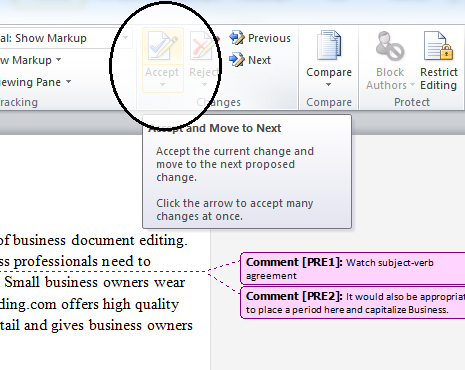

- #Microsoft word for mac eliminates track changes author information when saving pdf
- #Microsoft word for mac eliminates track changes author information when saving update
- #Microsoft word for mac eliminates track changes author information when saving archive
- #Microsoft word for mac eliminates track changes author information when saving software
I'm not sure if they are deeply serious ones, or why seriousness is so highly regarded by you, but again, you're publically slagging off the work of some very talented programmers who have put years of work into the software for no good reason that I can see here. > "even though many deeply serious professional authors won't touch it with a barge-pole."Īnd plenty of other authors do use it fine.

So again, this is an artefact of your choice in writing tool, not any indicator that Word is "utterly unusable". You would, for example, lose all your change tracking in your Word document when it had to go into Scrivener and back again. But you would still be in the same situation as minority user. If the situations were reversed Word would have export support for Scrivener for the same reasons. Of course Scrivener will export to Word because Word is the common standard and so it needs to. If the situation were the other way around and they all insisted you submit your work in Scrivener format and you wanted to use Word, you would be in the same situation.

You're basically damning it for being successful. > "I wrote the bloody thing in Scrivener (which is at heart an IDE for complex compound documents like, oh, trilogies), then generated a word document as output because my editors insist on working in Word because corporate IT at the big publishers thinks everyone uses it"Īgain, not really a reason for attacking Word. I'm unconvinced MS Word's inability to merge in one of your editor's hand-written amendments on hard-copy is a reason to call it "utterly unusable". And they want me to make another pass through it and do some structural changes. Then $EDITOR scribbled on a print-out with red ink. > "Unfortunately $EDITOR edited the word doc with change tracking. I wasn't real optimistic about actually getting it published anyway, but that just sounds like a nightmare scenario. That right there is enough to make me rethink my plans regarding a currently half finished tome I was considering sending off some day. Retire to the pub, weeping copiously, to consider the possibility of switching to an exciting and fulfilling career as a car park attendant or a tax inspector. Import resulting document into Scrivener and try to rebuild the book's structure and metadata by hand.Ĥ.
#Microsoft word for mac eliminates track changes author information when saving pdf
Go through change-tracked MS and PDF scan of hand-annotated print-out, applying handwritten changes. Go through change-tracked manuscript in Word (or LibreOffice) doing accept/reject on changes (I get to veto them at this stage).Ģ. Unfortunately $EDITOR edited the word doc with change tracking. I wrote the bloody thing in Scrivener (which is at heart an IDE for complex compound documents like, oh, trilogies), then generated a word document as output because my editors insist on working in Word because corporate IT at the big publishers thinks everyone uses it, even though many deeply serious professional authors won't touch it with a barge-pole. If he started the document under LibreOffice (which I suspect he did) It’s confounding why this is not a built-in feature in Word, but the workaround at least makes it possible to do what one wants! And, once mastered, it doesn’t take toooo long.Re: Doubly unusable if he moved the document My man, what a superb guru you truly are! Praise and worship upon you, o great one! (And a lot of thanks, too!)
#Microsoft word for mac eliminates track changes author information when saving archive
Rename the ZIP archive back to docx sothat it becomes a Word document again
#Microsoft word for mac eliminates track changes author information when saving update
Update the ZIP archive with the modified document.xml fileħ. Timestamp attributes and remove them from the document.xml file.Ħ. This regular expression will match all XML Search using the following regular expression:Īnd replace with nothing. Open and edit the document.xml file in a good text editor. Open the word folder in the ZIP archiveĤ. Open the renamed file, it will now open as a ZIP archiveģ. Rename the file to zip so it becomes a ZIP archive and you can easily open it using the appropriate toolsĢ. Follow the procedure below if you want to do this:ġ. I found that if you're saving the Word document as docx, you can edit the XML directly and remove the timestamps this way.


 0 kommentar(er)
0 kommentar(er)
